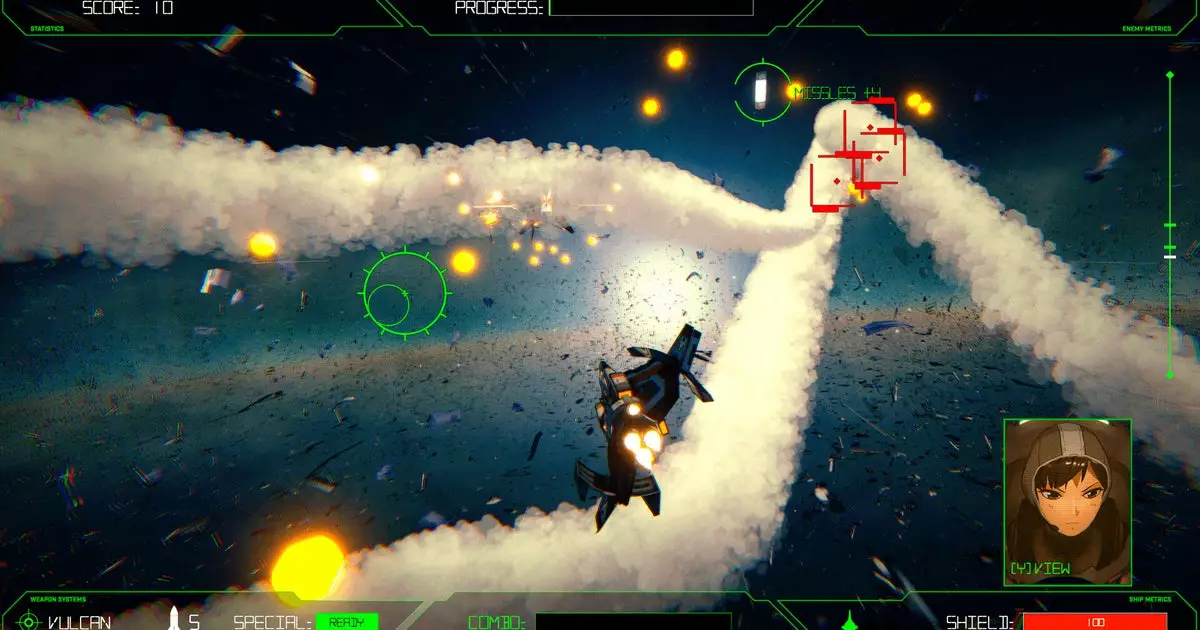In a world saturated with various gaming genres, Rogue Flight stands out as an arcade space combat game that evokes nostalgia while carving out its own niche. Drawing inspiration from the iconic styles of ’80s and ’90s anime, the game offers a dynamic fusion of thrilling gameplay and striking visual aesthetics. Unlike typical installments in the space combat genre, Rogue Flight employs a vibrant combination of acrobatic space maneuvers and frenetic dogfighting, reminiscent of the beloved StarFox series. This blend not only appeals to long-time fans of anime and arcade games but also introduces new players to the visceral experience of aerial combat.
Set to release later this year, Rogue Flight boasts a range of engaging gameplay elements that promise to keep players captivated. With nine distinct stages, the game allows players to navigate various environments, each filled with challenging enemies and strategically crafted obstacles. What sets Rogue Flight apart is its branching narrative paths. This feature not only enriches the player’s journey but also enhances replayability, allowing gamers to explore different outcomes and make critical decisions that influence their adventure. Furthermore, the inclusion of a roguelite mode adds a layer of unpredictability with its potential for permadeath, injecting an adrenaline rush that keeps players on their toes.
Customization is another highlight of Rogue Flight, enabling players to tailor their experience further. Whether it’s upgrading their spacecraft or fine-tuning their pilot, the options available promise to cater to individual playstyles. This level of personalization contributes significantly to the game’s overall charm, giving players a sense of ownership over their experience as they conquer the cosmos.
Rogue Flight’s marketing has focused heavily on its voice cast, featuring renowned Japanese actors celebrated for their roles in prestigious anime series such as Sailor Moon, Neon Genesis Evangelion, and Naruto. While the impact of these voice talents may resonate more with die-hard anime fans, the game’s English voice cast, comprising figures from hit titles like Fallout 76 and Overwatch, offers an additional layer of familiarity. This attention to voice acting enhances the game’s narrative by providing depth to the characters and enriching the storytelling experience. For those less inclined to appreciate anime’s subtitling quirks, Rogue Flight’s English dubbing option is a welcome inclusion.
Beyond the mechanics and narrative, the emotional gravity of Rogue Flight serves as its heart. Much like anime that delves into themes of anxiety, isolation, and existential dread, Rogue Flight touches on the melancholic essence of its characters and their unrelenting journeys through the stars. There’s a unique allure to the tragic narratives that often accompany mechs and spaceships in anime; they serve as metaphors for internal struggles. This thematic depth transforms combat into something more than mere entertainment—it becomes a reflection of the player’s own feelings and experiences.
In an age where games vie for attention through competitive mechanics and constant updates, Rogue Flight stands out by embracing its emotional undertones and aesthetic brilliance. This fusion of gameplay and thematic exploration not only appeals to fans of traditional arcade-style titles but also invites players to engage with their own melancholic imaginations as they navigate through a beautifully crafted universe. Ultimately, Rogue Flight offers a chance to pilot through both the stars and the intricate tapestry of human emotion, a potent combination that could elevate it to a new level of acclaim in the gaming community.


Leave a Reply